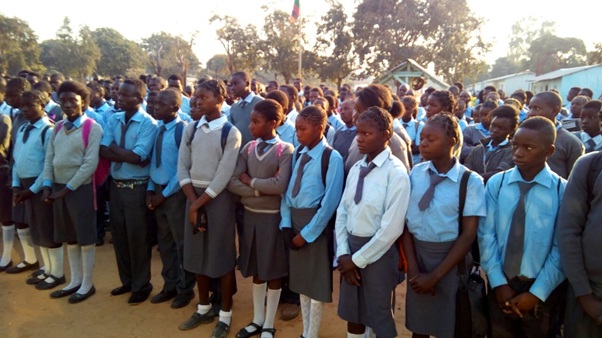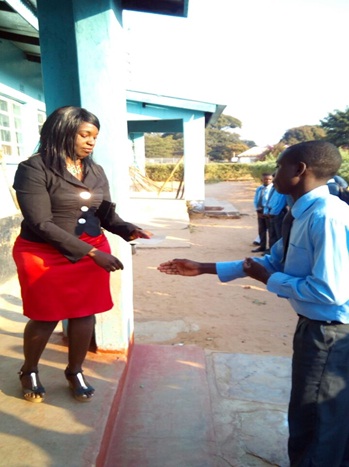Published on behalf of Katendi Nkanza, DfAD Education Lead
When I first started the competitions almost three years ago, it was just to get people interested in reading.
I have since joined DfDA as an education lead, and this is my first blog.
We just completed the short story competition in Chitokoloki primary school, Zambia, and have begun the poetry competition. The response was overwhelming and more than 300 students took part in the competition.
Five students were awarded K200 or £20.00 each. In a country where most people live on less than a dollar a day, this was a great incentive for the students to participant. Mr Martin Mate, the headmaster, Molly Nkanza Chisanga, and Womba Nkanza volunteers were on hand to offer support to the students.
The name Chitokoloki means “place of bright shining waters” and it truly is a lovely site, the locals are warm and welcoming. Even though the school has been there for many years, nothing much has happened in terms of development.
Chitokoloki is also known for its beautiful sunsets situated on the East banks of the mighty Zambezi River, in the North-Western Province of Zambia, Central Africa.
The Secondary School teaches roughly 475 pupils and the number of children at the primary school vary from 700 to 1000.
 The aim of the competitions is to help reduce illiteracy and poverty in Chitokoloki primary and secondary school in Zambezi, and Zambia.
The aim of the competitions is to help reduce illiteracy and poverty in Chitokoloki primary and secondary school in Zambezi, and Zambia.
I feel we can do this by looking at the root causes of the present situation, by taking into account the environment, and the stakeholders (teachers and parents, the community). Only by addressing the known causes can we then move forward and implement tools and technology to help improve the communities.
The students need to be involved and be proactive for any project implemented to work. They need to be very clear about what they expect to get out of the competitions.
I think if we set clear goals and objectives and not enforce our ideas on the students, we have a chance of empowering the next generation. Transparent and a selfless nature would be the highest attributes for us, as leaders, parents to operate effectively.
I strongly believe one must decide and make a choice, a selfless choice that in the long run can help better someone’s life. No one in this world is born wanting to be poor, but circumstances hinder certain people in society from reaching their greatest potential.
At DfAD, we endeavour to serve others not because of gaining praise but having the passion to alleviate suffering, to respond with compassion to the most vulnerable in our community. DfAD aims to establish “the link” between the Southern African Diaspora Communities in the United Kingdom, Africa and the World. It is through this passion that we are hosting an event on the 14th August 2015.
This event has been made possible by funding from the European Union via Bond. The conference is being delivered as part of the European Year for Development. To learn more and find out how you can get involved, please visit: www.bond.org.uk/eyd
Our Vision is for African Diaspora to have greater involvement in Africa’s development and for them to gain wider recognition for the various ways they contribute to Africa’s sustainable social and economic development, in both their countries of origin and destination. Only by educating the community, can we then reduce poverty, illiteracy and create jobs through social enterprise.
Please see below an extract from the UNESCO’s vision for the future on Education post 2015.
Education, as a key lever for development, is understood as a way of achieving social well- being, sustainable development and good governance.
The EFA Global Monitoring Report 2013/42 provides new evidence of education’s positive role in changing lives, and points in particular to the unmatched transformative power of educating girls and women. It demonstrates once more the key role of education in poverty eradication: education helps people access decent work and raises their incomes and, more generally, generates productivity gains that fuel economic growth. Education is also one of the most powerful ways of improving people’s health – and of making sure the benefits are passed on to future generations.
It is with his view in mind that I’m working with a team of dedicated volunteers to scale up the competitions and reduce inequalities in education in rural area. According to some local research papers, most exclusion from education occurs most often among girls, rural and indigenous peoples, working children, children living in conflict, orphans, migrants and nomads, children with disabilities, persons living with HIV/Aids. Pupils, in rural areas often face multiple disadvantages through gender discrimination and violence, sexual and reproductive health issues including teenage pregnancy, and poverty which bar them from enrolling and lead to dropouts at greater rates than those living in cities.
 Schools need passionate teachers, teachers who will move the pupils to do better; pupils need mentors, people they can look up to. I believe the education system is not lacking good well-meaning teachers: what may be lacking is the system and the environment in which they find themselves. I believe the Ministry of Education should look at improving the living conditions of teachers in rural areas. For example they can install solar panels. This will help students to study and get access to ICT training.
Schools need passionate teachers, teachers who will move the pupils to do better; pupils need mentors, people they can look up to. I believe the education system is not lacking good well-meaning teachers: what may be lacking is the system and the environment in which they find themselves. I believe the Ministry of Education should look at improving the living conditions of teachers in rural areas. For example they can install solar panels. This will help students to study and get access to ICT training.
A huge thank you to Mr Edwin Nkanza,Womba Nkanza, Molly Nkanza Chisanga, the headmaster and all the teachers at Chitokoloki Primary School, DfAD team for their support and contributions. I would like to thank Mrs Kamona Nkanza Muleya: Associate Specialist in Ophthalmology in Surrey, England for her prayers and continued support for the School.
“Education is a right that transforms lives when it is accessible to all, relevant
and underpinned by core shared values. Because quality education is the most
influential force for alleviating poverty, improving health and livelihoods,
increasing prosperity and shaping more inclusive, sustainable and peaceful
societies, it is in everyone’s interest to ensure that it is at the centre of the
post-2015 development agenda.”
Irina Bokova
As Nelson Mandela once said: It always seems impossible until it’s done.
By Katendi Nkanza
Katendi Nkanza is a published novelist and poet. She’s a member of the charted institute of IT and an MA Creative Writing Student at Birkbeck University.
She’s very passionate about Education and believes every child should have access to free education. She is interested in Development through Education and Empowerment of disadvantaged people across the globe.

No Comments to "Chitokoloki Basic School: Short Story Competition"